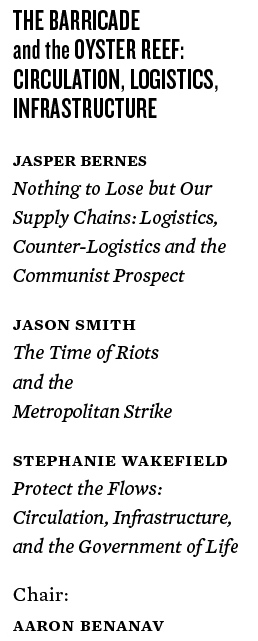Month: April 2013
“Containing (Dis)order” – PhD thesis by Craig Martin
Craig Martin has completed his PhD thesis at Royal Holloway last year. His research focuses on a spatial parameter — “distributive space” — which he identifies as being central “for understanding the formations of late capitalist modernity”.
“Containing (Dis)order: A Cultural Geography of Distributive Space“ is a fascinating work on the logistical spaces, practices and rationales the world economy is built on and a significant, timely contribution to growing scholarship on the spatialities of logistics and capitalist commodity mobilities.
Full abstract of his thesis:
“This thesis focuses on the significance of distributive space for understanding capitalist forms of spatio-temporality. It argues that the distributive phase of commodity mobilities has remained a relatively under-represented aspect of social theory, especially in the context of cultural and social geography. The extant work that has focused on distribution tends to be confined to the areas of economic and transport geography. The thesis aims to address the importance of this space for understanding the formations of late capitalist modernity, particularly its role as a specific, but networked space between production and consumption.
Significantly the work addresses the ‘construction’ of this space by focussing on the substantive case study of containerisation. In doing so it engages with global commodity mobilities in the form of intermodal shipping containers, and their attendant logistical infrastructure. The research critically considers the spatial and temporal apparatuses that have been developed to organise and order the mobilities of the containers; including the design and development of the object itself, alongside a range of logistics and supply chain management strategies.
In theoretical terms an important influence on the research has been Michel Serres’ work on the interlacing of order and disorder. Given this, a simultaneous focus of the research deals with the immanent presence of disorder in these systemic environments; thus reflecting an intellectual engagement with theoretical work in the areas of turbulence, complexity theory, assemblage theory and Serres’ work on the parasite. Substantively this aspect of the research has been determined by considering the place of the accident within networks and systems, alongside the ‘tactical-logistics’ of smuggling practices.”
You can download his thesis here.
See also his new blog: designgeographies.wordpress.com/
Mobility and Politics – New Series
Mobility & Politics – a new thematic series, edited by Martin Geiger, Parvati Raghuram and William Walters.
MOBILITY & POLITICS A New Series from Palgrave Pivot
Series Editors: Martin GEIGER, Carleton University – Parvati RAGHURAM, Open University – William WALTERS, Carleton University
Human mobility, whatever its scale, is often controversial. Hence it carries with it the potential for politics. A core feature of mobility politics is the tension between the desire to maximize the social and economic benefits of migration, and pressures to restrict movement. Transnational communities, global instability, advances in transportation and communication, and concepts of ‘smart borders’ and ‘migration management’ are just a few of the phenomena transforming the landscape of migration today. The tension between openness and restriction raises important questions about how different types of policies and politics come to life and influence mobility. Mobility & Politics invites original, theoretically and empirically informed studies for academic and policy-oriented debates. Authors examine issues such as refugees and displacement, migration and citizenship, security and cross- border movements, (post-)colonialism and mobility, and transnational movements and cosmopolitics.
Mobility & Politics invites original, theoretically and empirically informed studies for academic and policy-oriented debates. Authors examine issues such as refugees and displacement, migration and citizenship, security and cross-border movements, (post-)colonialism and mobility, and transnational movements and cosmopolitics.
Submissions to Mobility & Politics are ideally between 25,000 and 50,000 words and will be published within 3 months after peer review and acceptance of the final manuscript. Authors interested in submitting a proposal are welcome to contact the series editors ( mpp.series@gmail.com) or Christina M Brian (c.brian@palgrave.com).
Global Advisory Board: Michael COLLYER, University of Sussex; Susan B. COUTIN, University of California, Irvine; Raúl DELGADO WISE, University of Zacatecas; Nicholas DE GENOVA, Goldsmiths, University of London; Eleonore KOFMAN, Middlesex University; Rey KOSLOWSKI, State University of New York; Loren B. LANDAU, Wits University; Sandro MEZZADRA, University of Bologna; Alison MOUNTZ, Wilfrid Laurier University; Brett NEILSON, University of Western Sydney; Antoine PÉCOUD, University Paris 13; Ranabir SAMADDAR, Calcutta Research Group; Nandita SHARMA, University of Hawaii at Manoa; Tesfaye TAFESSE, Addis Ababa University; Thanh-Dam TRUONG, Erasmus University
HM 2013: Circulation, Logistics, Infrastructure
The Historicam Materialism conference will take place from 26-28 April 2013 at New York University. There will be, amongst many other interesting panels, a panel on Circulation, Logistics and Infrastructure. The full programme can be found on https://sites.google.com/site/2013hmny/program.
New film review section: Steinberg on The Forgotten Space
The Society & Space open site has published a review by Phil Steinberg of Allan Sekula and Noël Burch’s film “The Forgotten Space”!
An interesting compilation on US military logistics in Afghanistan and Pakistan by Derek Gregory.
In recent years much attention has been focused on the logistics of supplying the war in Afghanistan. But now the reverse operation is gearing up, and (as anticipated) it’s no more straightforward. Here’s Nate Rawlings for TIME:
For many good reasons, Afghanistan has been called a logistician’s nightmare. It is landlocked and far from a working port. Much of the country – especially in the east where a great deal of the fighting has taken place – is covered with mountains and threaded by decades-old roads and questionable bridges. The easiest way in and out of the country is a geopolitical minefield and the other two routes are three times as expensive.
And yet, for twelve years, logisticians have supplied troops with the equipment — large and small — necessary to fight a war. They have airdropped pallets of food and repair parts on remote bases, tossed “Speedballs” —…
View original post 596 more words
